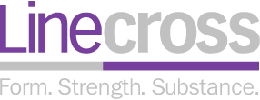Requirements
Linecross specialises in low volume manufacturing via vacuum thermoforming or polyurethane moulding. While both processes are relatively simple, the nature of the company’s business is anything but and leads to a wide range of business challenges, as David Austin, Finance Director explains. “We produce approximately 60,000 saleable units a month across an average product range of 800 different parts. Order sizes range from 1 to 5 for after-sale items up to batches of 1,000 – and every product is unique. On top of this huge variety of products, the ordering process and delivery expectations of our customers add significantly to our challenges.” And, as he repeats a number of times, the company mantra is “the customer’s assembly line can never be allowed to stop.”
Austin explains why even this does not begin to fully explain the difficulties that can arise in ensuring the company is making the right product, at the right time, for the right customer. “Take the example of our caravan customer – a 4 week schedule is fine except it doesn’t provide us enough time to necessarily procure all the required materials and additional parts. We have to work instead from the customer’s Indicative Build Plan which has a 4-5 month timescale.” He continues, “Take the example of an automotive customer. The schedule may say 200 units but when the delivery lorry turns up, we find they actually want 400 for the next day which we then have to somehow make in time because we can’t let the production line stop. Alternatively a customer may order 100 units for the following week, and then not collect them Monday, Tuesday, Wednesday or Thursday and then want to collect them all on Friday. We often have no way of knowing outside of a day by day basis.”
Given that some finished products including tractor roof panels and front and rear end panels for caravans are bulky, this can create storage issues. The requirement to ensure that certain materials are always in stock just in case a larger than expected confirmed order comes in also creates storage issues at a raw materials level. This is further compounded by certain raw materials either only being available at a certain time per month, in certain unit sizes or in varying unit sizes where the most economic batch quantity might not be the one required. And, as Austin points out, each order has its own unique tool that has been created for the customer but which also needs to be stored on site. “When you consider that many products have lengthy guarantee periods, these are tools we have to keep for many years in order to fulfil our after-sale commitments. All of this needs to be managed.”
As mentioned, the actual manufacturing process is relatively straight forward and begins with the raw material either being vacuum formed in the company’s 10 specialist machines or in the case of polyurethane products, moulded in one of 7 specialist presses. These cover a wide range of sizes and include some of the largest machines of their type in Europe with the vast majority of orders requiring a set piece of equipment. The part is then trimmed using the company’s 12, 5-axis CNC machines or in the case of large panels, by hand. After trimming, each part is then checked on a bespoke gauge before moving on to any final assembly and/or finishing steps. From here it is packaged and prepared for collection according to customer requirements.
Austin reiterates that the company’s biggest challenge stems from the sheer variety and number of different parts it manufactures, many of which may then require assembling to achieve the customer’s final product. “Accurately knowing how much to make, and when, across such a wide range of products is a real challenge. When things can change on a daily basis, we have to be flexible to react to sudden changes as and when they arise, which of course has a knock-on effect on everything else that is either being manufactured or scheduled for production.” He continues, “We also have real workflow challenges as a result of this. We need to balance setup and changeover times with the quantities of what we need to produce, but again, when in some cases we only know 24 hours in advance what a final order quantity may be, this can be difficult. Clear communication is essential across the company – from customer service managers who may have had discussions with a customer in the morning, to production managers who may then need to act on that information later in the day, through to procurement and purchasing needing to know what needs to be bought and when.”
Prior to investing in EFACS E/8 from Exel, Linecross had relied on a bespoke DOS-based manufacturing system that was set up by someone within the company back in 1992 when its annual turnover was only £3m. This was entirely separate to the company’s Sage accounts system, the lack of integration being a source of frustration in and of itself. By the time Austin and his business partner had taken over the company in 2003, turnover had doubled to £6m and the employee responsible for the DOS-based system had just left.

